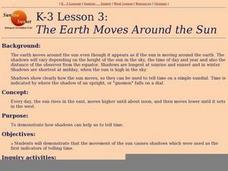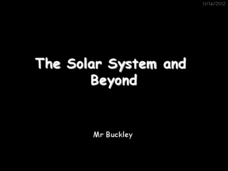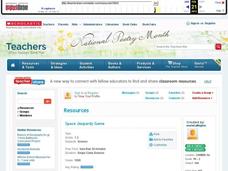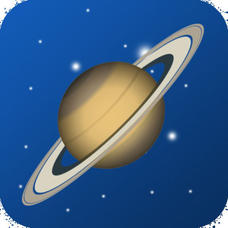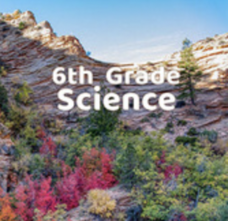Curated OER
Moon Phases Worksheet
In this moon phase worksheet, students identify the phases of the moon and draw pictures of the illuminated portion of the moon.
Curated OER
Reflected Light and the Moon
For this moon worksheet, students draw the different moon phases and name them. Students review why the moon has phases. This worksheet has 6 fill in the blank and 4 short answer questions.
Curated OER
What Shape is the Moon Tonight?
Students understand that the moon appears differently throughout the month. In this phases of the moon lesson, students observe and record the phases of the moon.
Curated OER
Moon
Students discover scientific facts about the Moon and how
some American Indian Tribes used the moon to measure time.
They accomplish this by listening to stories and poetry, writing
stories, communicating with an astronaut,...
Curated OER
The Solar System: Go Green with the Sun!
Third graders learn how to use solar power. For this sun, technology and energy lesson, 3rd graders learn how the solar power from the sun can give off energy, learn about solar panels, discuss their uses and benefits, and design a...
Curated OER
Origins: Earth Is Born
Students develop a timeline of all the major events involved in the formation of the Earth and the emergence of humans. In groups, they focus on a specific topic by watching a PBS program and taking notes. After the video, they list...
Curated OER
The Earth-Moon System
In this Earth and moon worksheet, students will review the different phases of the moon, how eclipses are created, and how the moon influences tidal patterns. This worksheet has 13 fill in the blank, 8 true or false, and 2 short answer...
Curated OER
Phases of the Moon
Students read "The Moon Seems to Change" and conduct an experiment with oranges to demonstrate the phases of the moon. They write about the experiment and describe each phase of the moon.
Curated OER
The Earth Moves Around the Sun
Students demonstrate that the movement of the sun causes shadows which were used as the first indicators of telling time.
Curated OER
The Solar System and Beyond
Survey the solar system by viewing this PowerPoint. Amateur astronomers discover that gravity is responsible for Earth's orbit around the sun and the moon's orbit around Earth. They explore the moon's phases and Earth's seasons. This...
PBS
Why Isn't There an Eclipse Every Month?
Searching for an eclipse activity that sends scholars over the moon? Try an interesting interactive to get their minds active! The resource, part of an extensive Space series from PBS Learning Media, uses modeling and data analysis to...
Curated OER
Science – Sun, Earth and the Moon
In this basic astronomy worksheet, students respond to 20 true or false questions pertaining to the Earth, the Sun, and Earth's moon.
Curated OER
Moon Glow
Students identify the Earth-Moon relationship and the phases of the Moon. They participate in an activity that illustrates why the Moon has so many different looks within a lunar cycle. They discuss solar and lunar eclipses.
Journey Through the Universe
How Far is Far?
The earth only revolves around one thing — and it's not any of your pupils. The lesson includes two activities dealing with the distance to the sun and the moon. First, scholars create a pin hole camera and use the rules of similar...
NASA
When Do Lunar Eclipses Happen?
Who needs the daylight to simulate a lunar eclipse? Astronomers model the positions of the Sun, Earth, and Moon to explain the necessary conditions for a lunar eclipse. Investigators cut and label a paper plate to represent the Earth and...
Curated OER
Day and Night
Expand your third graders' universe with a science activity about Earth's rotation. They read a short explanation about the direction of sunlight, then draw an arrow to indicate which way the sun is pointed at an illustration of the...
Curated OER
Space Jeopardy Game
Students explore space. In this space lesson, students analyze the sky and what causes its changes. Students describe the moon patterns and use a model to show changes in its shape. Students also describe the first trip to the moon....
Q Continuum
Planets
Have you ever looked up at the night sky and wondered what constellation you were seeing or whether that bright object was a star or a planet? Are you searching for the best tilt-to-view constellation and planet app that money can't buy?...
Utah Education Network (UEN)
Utah Open Textbook: 6th Grade Science
There are many interactions among living things and their surroundings. By completing a reading, scholars learn about the Earth, the moon, and the sun and how they relate to the solar system. They also investigate the basics of physical...
Curated OER
Earth and Beyond!
Pupils investigate one or more of the following topics and develop a plan for the future regarding it: global warming, lunar exploration, space travel, Mars exploration, or terraforming. They disucss the audio files and the video that...
Curated OER
The Moon
Learners design and build an ideal lunar settlement. In this astronomy instructional activity, students identify the key features of the moon. They compare its environmental condition with the Earth's.
Curated OER
Tides
Students discover how the position of the Sun, Moon and Earth affect tides. In this science lesson, students view a presentation about the tides. Students discuss the different types of tides.
Curated OER
Space: Stars and Planets
Students observe and report that the moon can be seen sometimes at night and sometimes during the day. They describe how changes to a model can help predict how the real thing can be altered. Students explain the essential fact of the...
EngageNY
The Motion of the Moon, Sun, and Stars—Motivating Mathematics
What does math have to do with the behavior of the earth and sun? Learn how the movement of celestial bodies has influenced the development of trigonometry. Scholars connects the details in mathematics to their...
Other popular searches
- Earth Moon Sun System
- Sun Earth and Moon
- Sun Moon Earth
- Earth and Moon and Sun
- Earth, Moon and Sun
- Rubric Sun Moon Earth
- Sun, Earth and Moon
- Sun Earth Moon System









